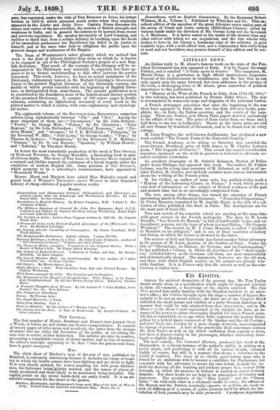LITERARY NEWS.
An Italian reply to M. About's famous work on the state of the Pon- tifical Government has just appeared at Paris. It is by Signor GiONILIZi Fabrizi, and is entitled " L'Italie apres is Guerre." The translator, M. Martin Doisy, is a gentleman in high official employment, Inspector- General of the etablissements de bienfaisance, and the fact that he not only openly puts his name forward, but even addresses, in the preface of the book, a challenging letter to M. About, gives somewhat of political importance to this publication.
A "History of the Wars of the French in Italy, from 1791 till 1814," in two volumes' has been published by Firmin Didot freres. The test is accompanied by numerous maps and diagrams of the principal battles.
A French newspaper calculates that since the beginning of the war there have appeared in Paris alone not leas than 450 new books, pam- phlets, &c., on Italy, the Italian question, and the events of the cam- paign. There are, besides, now fifteen Paris papers devoted exclusively to the affairs of the war. The price of them varies from one franc and a half down to one sou (a halfpenny). Sheets at the latter price are sold all over France by hundreds of thousands, and to be found now in every cottage.
M. Leon Feugere, the well-known feuilletonist, has produced a new work entitled "The Female Poets of the Sixteenth Century."
The French Academy, at its sitting on Saturday last, awarded the great literary Monthyon prize of 2000 francs to M. Charles Lafont's poem, "The Legends of Charity." This award has caused considerable sensation, inasmuch as the work in question is believed to advocate so- called socialistic tendencies.
An excellent biography of M. Gabriel Delassert, Prefect of Police under Louis Philippe, has appeared this week. The author, M. Fripier Lefranc, was for a long time secretary of M. Delessert, as will as of an- other Prefect, M. earlier, and his book contains most curious information about the working of the French police.
hi. Du Cellier, an author of some note, has published this week a "History of the Labouring Classes in France," a work which gives a vast deal of information on the subject of French workmen of the past and present time, but in an exceedingly compressed form.
The war, among other things, has turned the attention of French speculating minds to Piedmontese literature. " Nouvelles Piementaises," by Victor Ndersezio, translated by If. Amedee Roux, is the title of a col- lection of tales 'published this week in Paris. The descriptions are for the most part of rural life.
Two new novels of the romantic school are meeting at the same time with great success in the French metropolis. The first, by M. Louis Beaufils, "Les Secrets du Hasard," is full of hairbreadth 'scopes and ex- traordinary persons, not the least of whom is a mad Briton, "Sir Gregory Weidman. ' The second, by M. J. Cenac Moncaut, is called "Adelaide de Montfort ou lea Albigeois, ' and is one of those mixtures of history and fiction, in which the former is drowned in the latter.
The science of Gall and Spurzheim has found another bitter adversary in the person of M. Lelut, men mber of the Institut of Paris. Under the
title of Phrenology, its tory, its Systems, and its Condemnation," he has published a volume, in which the doctrines of the "skull-teach- ers," (schfidel-lehrer) as the Germans call them, are most unmercifully and systematically abused. The arguments, however, are the old ones, and those with which English readers on the subject are already tole- rably familiar. It is in France only that the science as well as the con- troversy is rather new.


























 Previous page
Previous page